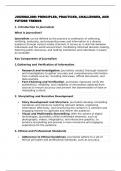JOURNALISM: PRINCIPLES, PRACTICES, CHALLENGES, AND
FUTURE TRENDS
1. Introduction to Journalism
What is Journalism?
Journalism can be defined as the practice or profession of collecting,
verifying, analyzing, and presenting news and information to a diverse
audience through various media channels. It serves as a vital link between
individuals and the world around them, facilitating informed decision-making,
fostering public discourse, and holding institutions and individuals in power
accountable.
Key Components of Journalism
1.Gathering and Verification of Information
Research and Investigation: Journalists conduct thorough research
and investigations to gather accurate and comprehensive information
from multiple sources, including interviews, official documents, and
data analysis.
Fact-Checking and Verification: Journalists rigorously verify the
authenticity, reliability, and credibility of information obtained from
sources to ensure accuracy and prevent the dissemination of false or
misleading content.
2. Storytelling and Narrative Development
Story Development and Structure: Journalists develop compelling
narratives and stories by selecting relevant details, organizing
information effectively, and structuring the content in a coherent and
engaging manner to captivate and inform the audience.
Visual and Multimedia Storytelling: With the advent of digital
technologies, journalists utilize multimedia elements, such as
photographs, videos, infographics, and interactive graphics, to
enhance storytelling and provide a more immersive and engaging
experience for the audience.
3. Ethical and Professional Standards
Adherence to Ethical Guidelines: Journalists adhere to a set of
ethical principles and professional standards, such as accuracy,
, fairness, impartiality, transparency, and accountability, to maintain
integrity, credibility, and public trust in their work.
Conflict of Interest and Disclosure: Journalists disclose any
potential conflicts of interest, affiliations, or biases that could influence
their reporting and commit to transparency and impartiality in their
coverage of events, issues, and individuals.
4. Audience Engagement and Public Interaction
Audience-Centric Reporting: Journalists engage with their audience
by understanding their interests, preferences, and concerns and
creating content that resonates with their needs and expectations.
Feedback and Interaction: Journalists encourage feedback,
comments, and questions from the audience to foster dialogue,
participation, and community engagement, and to improve the quality
and relevance of their reporting.
5. Adaptability and Innovation in Digital Journalism
Digital Skills and Multimedia Production: Journalists possess
digital skills and expertise in multimedia production to adapt to the
evolving media landscape and create innovative and engaging content
across various platforms and channels.
Data Journalism and Data Visualization: Journalists utilize data
journalism techniques and data visualization tools to analyze, interpret,
and present complex data sets and information in a clear, accessible,
and visually compelling manner to enhance understanding and
facilitate informed decision-making.
6. Accountability and Responsibility in Reporting
Transparency and Corrections: Journalists maintain transparency in
their reporting processes, methodologies, and sources and promptly
correct any errors, inaccuracies, or misinformation to uphold the
highest standards of journalistic integrity and accountability.
Impact and Social Responsibility: Journalists recognize their role
and responsibility in society and strive to produce impactful,
meaningful, and socially responsible journalism that addresses
, pressing issues, challenges, and concerns and contributes to positive
change, awareness, and advocacy.
Role and Importance of Journalism
Informing the Public: Journalism plays a crucial role in providing the
public with timely, relevant, and accurate information about local,
national, and global events, issues, and developments. It empowers
individuals to make informed decisions, engage in public discourse,
and participate actively in democratic processes.
Promoting Accountability and Transparency: Journalists act as
watchdogs, holding individuals, institutions, and governments
accountable for their actions, decisions, and policies. Through
investigative reporting and critical analysis, journalism exposes
wrongdoing, corruption, and abuses of power, fostering transparency,
accountability, and public trust.
Facilitating Dialogue and Understanding: Journalism facilitates
dialogue and understanding by presenting diverse perspectives,
sharing personal stories, and exploring complex issues and debates. It
promotes empathy, tolerance, and mutual respect by highlighting
shared human experiences, challenges, and aspirations across
different communities, cultures, and societies.
Safeguarding Democracy and Freedom of Expression: Journalism
is fundamental to democracy and freedom of expression, serving as a
cornerstone of democratic societies by providing a platform for free
and open debate, dissent, and critical thinking. It defends and upholds
democratic values, principles, and rights by exposing abuses of power,
promoting civic engagement, and encouraging public participation in
governance and decision-making processes.
2. Types of Journalism
1. Investigative Journalism
Definition: Investigative journalism involves in-depth research, analysis, and reporting to
uncover and expose hidden truths, corruption, wrongdoing, and abuses of power that may
not be readily apparent to the public.
Key Characteristics:
Deep Research: Investigative journalists invest significant time and resources in
researching and verifying information from multiple sources to uncover hidden facts and
insights.




